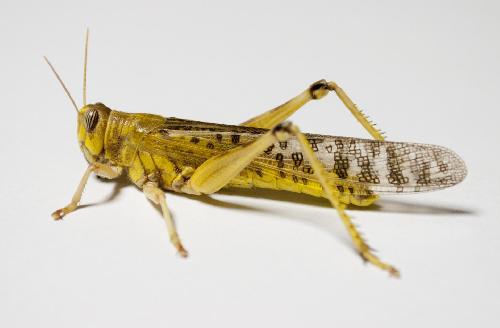Dublin, April 6th, 2016 - Biomechanics researchers from Trinity College Dublin have discovered how insects build internal bandages to repair their broken 'bones'. A DIY cuticle repair kit allows wounded insects to go about their day-to-day lives almost as efficiently as they would have done before meeting with mishap.
When an insect cuts one of its legs, it kicks into repair mode by laying a patch of new cuticle underneath the affected area. This new cuticle effectively functions as a bandage, which seals the wound and provides structural strength where it is required.
The study, which has just been published in international journal Interface, is the first to ever assess the biomechanics of repair in arthropods. Insects are the most species-diverse group of animals on the planet.
 Locusts are able to repair their injured bodies by deploying a DIY cuticle repair kit after meeting with mishap. Repaired limbs provide around two-thirds of their original strength, which helps individuals from the world's most diverse group of animals to survive in the wild. Credit: Professor David Taylor (Trinity College Dublin).
Locusts are able to repair their injured bodies by deploying a DIY cuticle repair kit after meeting with mishap. Repaired limbs provide around two-thirds of their original strength, which helps individuals from the world's most diverse group of animals to survive in the wild. Credit: Professor David Taylor (Trinity College Dublin).
Lead author, Professor of Materials Engineering at Trinity, David Taylor, said: "Unlike us, insects cannot completely repair their 'bones', but it turns out that by using this cuticle bandage they can do a pretty good job. They are able to restore most of the original strength, which allows them to keep using their limbs for normal activities."
The research team found that adult desert locusts were able to repair damaged limbs to restore approximately two-thirds of their original strength, which is of paramount importance for their survival in the wild, where their limbs are highly loaded during jumping (a key attribute that helps insects avoid predators and find food).
Researcher Eoin Parle, who carried out these ground-breaking experiments, added: "There has been some previous work to show that - like humans - insects will bleed when you cut them, and the blood will clot to plug the hole. But nobody had tested the strength of these repair patches until now."
source: Trinity College Dublin